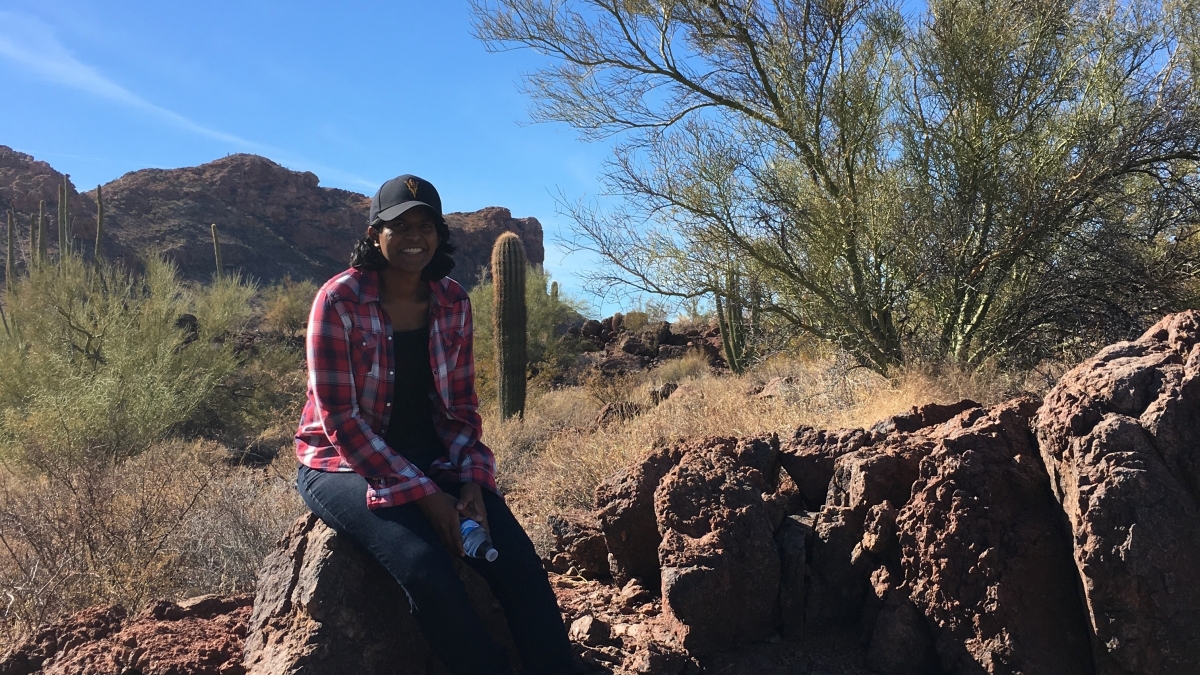History grad takes learning to Sonoran Desert

"How can you learn about immigration living in Arizona without hearing your footsteps on the Sonoran Desert floor?" said Judith Perera, who new courses for history students that linked the past to the present and connected the topic to current events and took her students on field trips to the desert.
Editor’s note: This is part of a series of profiles for spring 2018 commencement.
Judith Perera is ready to finish her 26th consecutive year of school. In those 26 years, she has done a lot, from an undergraduate degree in history to a law degree from Pepperdine University and now a PhD in history from ASU’s School of Historical, Philosophical and Religious Studies.
During her time at ASU, the Sri Lankan-born Perera has had an influence on both ASU and the surrounding deserts of Arizona. After the impact of one religious studies professor, she changed her dissertation topic and focused on the past, present and future of immigrant detention, deportation and mass incarceration.
She developed new courses for history students that linked the past to the present and connected the topic to current events. She designed the Constitutional Rights of Criminal Defendants course to address how the Bill of Rights evolved and where things stand today. She also designed the History of Deportation course and took students out to witness deportation in real life.
“I wanted to take advantage of the amazing place we live in and incorporate the landscape of Arizona into the classroom while at SHPRS,” Perera said. “I mean, how can you learn about immigration living in Arizona without hearing your footsteps on the Sonoran Desert floor? I did some field trips to the desert during my Citizens, Immigrants and the Undocumented class I developed. The students walked the desert, filled water tanks for migrants at the border, and took a field trip to a detention center where they grilled an ICE agent. It was a proud instructor moment when he politely asked us to leave.”
Perera answered a few questions about her time at ASU and her future, including her upcoming documentary.
Question: What was your “aha” moment, when you realized you wanted to study the field you majored in?
Answer: As an undergraduate, I switched from political science to history because I missed reading books and I saw that one of my roommates (who was a history major) was always reading. After law school, it was easy to return to history because I had enjoyed it so much as an undergrad.
Q: What’s something you learned while at ASU — in the classroom or otherwise — that surprised you, that changed your perspective
A: I was introduced to noncitizen detention while taking Dr. Leah Sarat's course in the fall of 2015, and that fundamentally changed everything for me. I changed my dissertation topic and began researching how such an insane system existed and its history. I think I can divide my life into two parts based on that: before that class, and after. Completing the dissertation, with the help of faculty and my peers, has made things a lot clearer for me. I don't know that I completely understand it all but at least I tried to!
Q: What’s the best piece of advice you’d give to those still in school?
A: Read as many history books as possible.
Q: What was your favorite spot on campus, whether for studying, meeting friends or just thinking about life?
A: The rooftop of Coor Hall on the sixth floor. You can see much of the campus from there, and I liked spending time reflecting there.
Q: What are your plans after graduation?
A: This summer I will be working on a documentary that will premiere this September as part of the States of Incarceration national exhibit when it comes to Phoenix. The trailer for the documentary is available here. I'm still trying to figure out what I'd like to do after that. I've been in school so long, and I'm thinking I might take a break for a while and figure out what comes next. I'm excited about the openness of it all and looking forward to whatever the next step might be.
Q: If someone gave you $40 million to solve one problem on our planet, what would you tackle?
A: I’m not sure whether a fixed amount of money can solve or attempt to solve any of the numerous systematic problems that are due to our current economic structure. However, if there is a sum on the table, I would use the money to pay off people’s bonds and bail across the United States so they can return home to their communities and not be held in cages.
More Arts, humanities and education

Pen Project helps unlock writing talent for incarcerated writers
It’s a typical Monday afternoon and Lance Graham is on his way to the Arizona State Prison in Goodyear.It’s a familiar scene.…

Phoenix civil rights activists highlighted in ASU professor’s latest book
As Phoenix began to grow following WWII, residents from other parts of the country moving to the area often brought with them Jim…

Happy mistake: Computer error brings ASU Online, on-campus students together to break new ground in research
Every Thursday, a large group of students gathers in the Teotihuacan Research Laboratory (TeoLab) in the basement of the…

